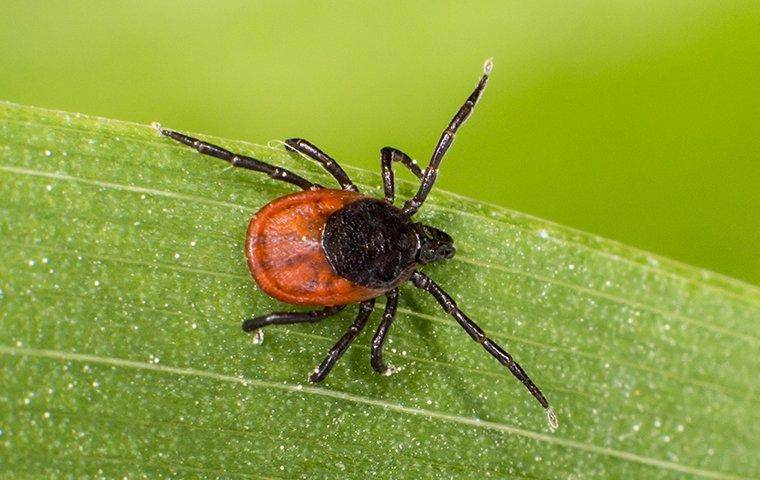
Black-Legged Deer Ticks in Merrimack
What Are Black-Legged Deer Ticks?
Black-legged deer ticks have brownish-orange bodies and distinctive dark-colored legs. They are often called "deer" ticks because of their affinity for feeding on the blood of white-tailed deer but don’t let the name fool you; they also feed on many other warm-blooded animals. People, dogs, cats, rodents, raccoons, and skunks are also regular hosts of these blood-feeding pests. These ticks are very small and easily overlooked when on yourself or your pets. Their sharp mouthparts pierce their host's skin, and you can see these mouthparts when viewing the tick from above.

Are Black-Legged Deer Ticks Dangerous?
Black-legged deer ticks carry and transmit Lyme disease and are dangerous pests to have lurking around your yard. Lyme disease is a debilitating disease caused by a bacteria that deer ticks transmit through their saliva. The slow feeding process allows them to transmit diseases quite efficiently. The longer the tick is attached to their host, the more likely they will transmit the disease they are carrying.
Why Do I Have a Black-Legged Deer Ticks Problem?
Ticks are arachnids which means they are unable to jump or fly. Their main modes of transportation are by crawling or hitchhiking on their hosts. Black-legged deer ticks will crawl to the tops of blades of grass, weeds and wait for a host to brush past them that they can attach themselves to. As the host moves from place to place, the ticks move with them.
Where Will I Find Black-Legged Deer Ticks?
The most common places to come into contact with black-legged deer ticks are areas where there is moisture, dense vegetation or grass, and lots of animal activity.
Some of the most common places people and pets come into contact with these ticks include:
- Wooded trails
- Fields and meadows
- Suburban or urban yards
Like most ticks, black-legged deer ticks are most problematic in our Salem outdoor spaces. They are unable to breed indoors.
How Do I Get Rid of Black-Legged Deer Ticks?
Partner with Mosquito Busters to keep your property protected from black-legged deer ticks. The spread of Lyme disease by black-legged deer ticks in our region is a huge concern, and protecting your yard and family from coming into contact with these pests is important!
Ticks are both frustrating and dangerous; their presence means that you can’t thoroughly enjoy your outdoor space without worrying about becoming a food source. At Mosquito Busters, we protect properties from becoming overrun by ticks. We offer tried-and-true tick control methods, which are affordable, highly effective, and always performed by our specially trained technicians.
To learn more about our reliable tick control services in Massachusetts or New Hampshire, give us a call today!
Commitment to Quality, Guaranteed Solutions.

-
Investing in Ourselves, For YouWe have a state of the art facility and lab onsite, where all new techs are trained. We put a big emphasis on investing back into our team, so they can deliver you the highest quality of service.
-
Our Commitment to You
At Freedom Pest Control, our customers always come first. Our values are centered on treating you with professionalism, courtesy, accountability, and integrity.
-
30+ Years of Experience & Knowledge
Freedom Pest Control has been serving Boston and the surrounding areas for over 30 years. We're committed to providing you with the best possible service, every time.
How Can I Prevent Black-Legged Deer Ticks in the Future?
As well as partnering with Mosquitoes Busters, the following prevention tips will help you avoid contact with black-legged deer ticks.
- After walking outside or spending time in wooded areas, always check yourself and your pets carefully for these small ticks.
- When walking on wooded trails, always stay at the center of the path.
- Keep the grass in your yard short and remove areas of dense or overgrown vegetation.
- Cut tall grass back away from fence lines, porch steps, and the foundation of your home.
- Cut wooded areas back away from the perimeter of your property.
- Don’t purposely feed wild animals on your property.
- Place your pets on a tick preventative program under the guidance of their veterinarian.
Learn more about our quality all-natural pest control products in Massachusetts and New Hampshire.


William F.
“Many thumbs up for Freedom Pest Control. Timely, responsive, and professional. All actions were explained with thoroughness.”
Latest Blogs
-
Flea Prevention 101: How to Keep Fleas at Bay Year-Round Read More
-
Types of Ticks Read More
-
 Pest Spotlight: How To Get Rid Of Merrimac's Termites Read More
Pest Spotlight: How To Get Rid Of Merrimac's Termites Read More -
 Natural Ways To Keep Mice In Merrimac Out Of Your Home Read More
Natural Ways To Keep Mice In Merrimac Out Of Your Home Read More -
 Portsmouth Homeowners' Helpful Spider Prevention Guide Read More
Portsmouth Homeowners' Helpful Spider Prevention Guide Read More -
 The Most Simple Way To Deal With Bed Bugs In Merrimac Read More
The Most Simple Way To Deal With Bed Bugs In Merrimac Read More





